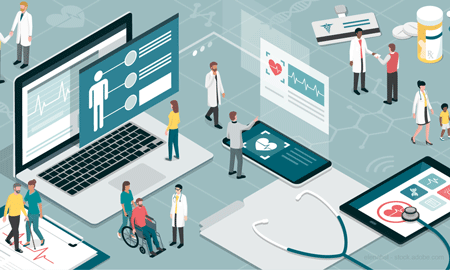Disruption comes to health care
As the Center announces a major new research initiative about health care, director Jeffrey Cole shares the first lessons from the Future of Health project.
By Jeffrey Cole
We Americans spend more money to keep ourselves healthy than on any other aspect of our lives. In 2018, we spent $3.6 trillion on health care or $11,172 per person, an amazing 17.7% of GDP. Nothing else, defense or otherwise, comes close.
 When bank-robber Willie Sutton was arrested and asked why he robbed banks, he allegedly was surprised at the question. He replied, “Because that’s where the money is.” Health care in the U.S. is where is the money really is.
When bank-robber Willie Sutton was arrested and asked why he robbed banks, he allegedly was surprised at the question. He replied, “Because that’s where the money is.” Health care in the U.S. is where is the money really is.
With so much money spent to cover less than 90% of the population at high costs, health care is ripe for disruption.
The Center’s work shows that industries with inflated costs, poor service, and inefficient ways of delivering their products or services are ready to be disrupted. Think of the music or taxi industries. Health care has all those qualities, and there’s a massive amount of money to be made disrupting the current system.
That’s why the Center, in a new “Future of Health” project, has taken a major look at the health and medical establishment in order to determine Americans’ satisfaction with health care services and outcomes -as well as the role technology will play in changing our relationships with doctors and hospitals.
Over the next few months, the Center will issue six or seven short releases on various aspects of health and medical care, as well as alternative treatments. The first release (here) examines medical coverage and user satisfaction. In future weeks, we will look at current and future medical technologies, how we get medical information (particularly online) and what we do with it, relationships with doctors and hospitals, alternative treatments (including marijuana), and attitudes toward medical privacy.
Here are some high-level snippets from the new data set:
- The vast majority of Americans say they are satisfied with their medical overage. Of the 88% who have coverage (whether from employment, self-insurance, or Medicare), 80% say they are somewhat or very satisfied with their coverage. Only 6% assert they have some level of dissatisfaction with their coverage. Of course, 12% of Americans, the highest percentage in the industrialized world, have no coverage at all. These people can only hope that they stay healthy.
- A deeper reading of other data in our project quickly shows that 88% of Americans are “satisfied” with their coverage only because it protects them from the abyss. One-third of Americans lack confidence that their insurance will cover their needs. More than 25% are only slightly confident that they have protection from medical or financial disaster. Hardly reassuring numbers.
- When given options and other choices, Americans quickly back away from their support of the current health coverage system. Twenty-one percent of covered workers are afraid to change jobs or seek other opportunities because it might mean losing their insurance. Almost one-fifth feel locked into their current positions, with women feeling this considerably more than men.
- Most alarmingly, of Americans who are covered by some form of insurance, 33% would allow their insurance companies to monitor their activities 24/7–including what they eat and how much they exercise–if it meant lower insurance rates. Think of what the non-insured might be willing to give up for coverage!
- Almost as many Americans, 24%, would be willing to work with an Artificial Intelligence instead of a human doctor if it meant lower rates.
Alternatives to classic insurance companies
Concern about coverage costs also leads many to consider buying insurance from non-health companies or unrelated sources. Thirty percent would consider buying coverage from any type of company that provides lower costs.
___________________________________________________________________________
The Center’s work shows that industries with inflated costs, poor service, and inefficient ways of delivering their products or services are ready to be disrupted. Think of the music or taxi industries. Health care has all those qualities, and there’s a massive amount of money to be made disrupting the current system.
___________________________________________________________________________
While people say they would consider “any” company to provide lower coverage costs, it is the best-known and most trusted brands that consumers look to: Amazon, Google, Walmart, and Costco. Why? Because we are already comfortable buying a range of services and products from these companies that go outside of their core competencies (pharmacy, vision, financial services including banking, travel, and more).
Even though most Americans have some sort of relationship with Facebook, the company does not inspire confidence outside of its core business (and perhaps not in it, either). Only six percent of Americans would consider buying health coverage from Facebook.
Looking at our data in all its depth and complexity, it is impossible to support the belief that Americans are really satisfied with their current health care coverage. This is one of the reasons that 92% of Americans believe that health care will be a significant issue in the 2020 elections.
On February 15, Speaker of the House Nancy Pelosi said that in the leadup to the November elections, the Democrats must turn away from investigations of the president and instead pivot towards “health care, health care, health care.” Our work shows that Speaker Pelosi is right.
Health care as a basic human right
Just as obvious is Americans’ belief that everyone is entitled to health care coverage regardless of ability to pay. Eighty percent support the belief that health care is a basic human right of all Americans. Not surprisingly, the number is even higher (95%) among the very liberal.
What is truly surprising and represents significant change over the past 20 years is that a majority (56%) of those that call themselves very conservative also believe that everyone is entitled to health care–whether they can afford it or not. And, middle-of-the-road citizens come out higher (84%) than the country’s average.
Health care coverage as an issue has moved to the top of the agenda. It may well determine the shape of the next Congress and White House.
The Center’s Future of Health data shows that a simple question–for example, “Are you satisfied with your health coverage?”–cannot be taken at face value. It is our job to probe deeper behind the question. A deep reading of our work shows enormous dissatisfaction with the quality of coverage (although not the health care itself).
Across our different projects and data sets, the Center’s work shows one consistent lesson: industries that refuse to recognize when the ground is shifting beneath their feet, and the need to disrupt themselves, seldom come out well.
Whether health insurance companies are mildly disrupted (i.e., they need to adapt policies and rates in the face of non-traditional competition) or completely disrupted (i.e., the government takes over coverage and eliminates private insurance), a groundswell of disruption has begun.
____________

Jeffrey Cole is the founder and director of The Center for the Digital Future at USC Annenberg.
See all columns from the center.
February 19, 2020

